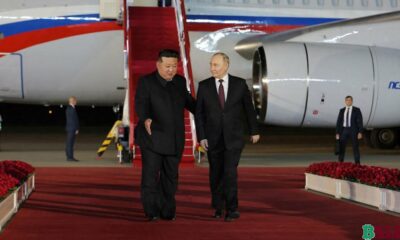World
The New EU Pact on Migration and Asylum: A Missed Opportunity for Integration
Explore the implications of the New EU Pact on Migration and Asylum, analyzing how it falls short in promoting effective integration of migrants and asylum seekers into European societies. A critical look at missed opportunities for a cohesive approach.

The New EU Pact on Migration and Asylum: A Missed Opportunity

After eight long years of negotiations, the European Union has finally reached an agreement on a new framework under the New Pact on Migration and Asylum. However, instead of delivering effective solutions, this newly minted Pact appears to deepen the existing challenges.
Designed to foster a more coordinated and cohesive approach to migration and asylum across the EU, the New Pact ironically neglects the vital role that cities play in this context. Cities are at the frontline of providing essential services and integration policies for migrants, yet their contributions are overlooked.
Integration Takes Place at the Local Level
Integration is fundamentally a local endeavor. Despite the ongoing political maneuvering at the EU level surrounding migration regulation, it is the cities and municipalities that are actively making integration a reality. The New Pact aims to delineate Europe’s responsibilities towards migrants and refugees while establishing a practical framework for action. However, as deputy mayors of Amsterdam and Vilnius, we identify several serious issues that could hinder its effective implementation, potentially leading to adverse outcomes for both migrants and local authorities.
Legal Migration: An Economic Necessity
Europe has been grappling with a multitude of crises in recent years, which have exacerbated existing inequalities and fueled the rise of populism. This climate has resulted in heightened hostilities, increased alienation, and a troubling disregard for vulnerable groups, including migrants and refugees.

While touted as “a set of new rules managing migration and establishing a common asylum system at the EU level that delivers results while remaining grounded in our European values,” the New Pact primarily reinforces the narrative that migration is a threat that must be controlled. By emphasizing border security, stringent screening processes, and externalizing asylum procedures through agreements with non-EU countries, the Pact frames migration as a security risk rather than a humanitarian concern.
Alarmingly, the New Pact overlooks the fundamental principle that all individuals, regardless of their origin or reasons for migrating to the EU, deserve fair, dignified, and humane treatment. Although international law grants migrants the right to seek asylum in any EU member state, the Pact’s focus on establishing processing centers at EU borders undermines this right. Despite promises of “independent monitoring,” there is no assurance that individuals detained in these “border-centres” will receive the legal assistance they are entitled to.
Recognizing legal migration is not merely a policy choice; it is an economic imperative for Europe’s future. The EU must conduct a candid self-assessment regarding the selective openness it maintains.
Furthermore, the screening regulations governing the intake and processing of individuals at the border fail to distinguish between regular migrants and vulnerable groups such as unaccompanied minors. This oversight could result in inadequate protection and support for those in need, potentially leading to the unjust detention of minors during the processing of their applications. Such severe measures could exacerbate the trauma often experienced by migrants and drive more individuals to take perilous alternate routes, resulting in increased numbers of undocumented migrants in cities across Europe.
Moreover, the New Pact largely perpetuates the problematic Dublin system, failing to address the lack of political solidarity among member states regarding a fair distribution of refugees across the Union. Europe is currently facing demographic shifts and a declining workforce. With decreasing birth rates and an aging population, the demand for workers in various sectors, particularly healthcare and technology, is soaring.
By streamlining legal migration pathways rather than fortifying borders, Europe can attract skilled migrants eager to contribute. This approach not only addresses immediate labor shortages but also enriches European societies with diverse talents and perspectives, ensuring long-term economic growth and social cohesion.
Local Authorities: The Key to Effective Integration
The EU professes a desire to learn from successful integration policies, yet the New Pact fails to acknowledge the critical role of local authorities in this process, which have repeatedly demonstrated resilience in addressing today’s geopolitical challenges. Approximately 75% of Europe’s population resides in urban areas, where integration directly occurs. However, the Pact introduces numerous risks for cities. Increased responsibilities to accept refugees may strain local resources and services, especially in the absence of adequate EU funding for integration programs.
The Pact’s focus on border management rather than long-term integration overlooks the pressing need for skilled labor. Effective integration policies, executed at the local level, are essential for ensuring that refugees and migrants can become productive members of their new communities.
Cities like ours recognize the unique needs of those fleeing conflict and political oppression and possess extensive experience in integrating newcomers, offering everything from language courses to labor market integration initiatives.
Investing in Sustainable Integration
Investing in sustainable integration yields long-term benefits, supporting refugees and migrants in becoming contributing citizens of their host countries and local communities. Amsterdam, historically known for its welcoming approach to refugees, has implemented successful programs to assist migrants in finding employment through collaborations with employers and personalized guidance.
Similarly, Vilnius has showcased the effectiveness of local authorities in the face of migration challenges. In response to the EU-Belarus border crisis and Russia’s invasion of Ukraine, the city has partnered with various NGOs to support refugees. It established the Psychotraumatology Centre for those fleeing war, staffed by Ukrainian professionals, while another initiative, International House Vilnius, has aided refugees in settling into the city.
Europe’s Future Lies Within Its Cities
Cities, with their hands-on experience, are crucial for making integration successful. Therefore, as deputy mayors, we firmly believe that incorporating local authorities into policymaking must be a top priority moving forward with the new EU mandate.
The New EU Pact on Migration and Asylum may aspire to create a unified approach to migration, but it fails to adequately address immediate needs and uphold human rights. By sidelining cities and concentrating on border management, the Pact misses the opportunity for sustainable long-term integration.
To effectively tackle migration, the EU must harness the experience and expertise of cities, ensuring fair treatment and robust support for all migrants. A brighter future for Europe begins in its cities.
Simona Bieliūnė is the Deputy Mayor of Vilnius, and Rutger Groot Wassink is the Deputy Mayor of Amsterdam.
At Euronews, we believe all views matter. Contact us at view@euronews.com to send pitches or submissions and be part of the conversation.
World
Dominique Pelicot Testifies in Harrowing Rape Trial
Join us as Dominique Pelicot courageously testifies in a harrowing rape trial, shedding light on the complexities of trauma and justice. Her powerful story raises crucial questions about the legal system and the importance of support for survivors.

Dominique Pelicot Takes the Stand in Shocking Rape Trial
In a courtroom drama that has captivated France and garnered international attention, Dominique Pelicot, the man at the center of a harrowing rape trial, finally addressed the court. With tears streaming down his face, he recounted how his wife had been instrumental in helping him cope with a tumultuous past marked by trauma. He revealed that he had endured a sexual assault at the tender age of nine while hospitalized, and he also witnessed a gang rape during his teenage years while working as an apprentice electrician on a construction site.
“She didn’t deserve this, I acknowledge that,” Mr. Pelicot stated, his voice barely audible as he struggled to convey his emotions. The gravity of the situation weighed heavily on him, and the courtroom fell silent, straining to catch his every word.
Now 71 years old, Mr. Pelicot faces serious allegations of drugging his wife, Gisèle Pelicot, whom he has been married to for half a century, over a span of nearly ten years. Prosecutors contend that he used drugs to render her comatose, allowing him to rape her repeatedly. Furthermore, authorities allege that he went so far as to invite numerous men into their home, facilitating a nightmarish scenario where they, too, engaged in the assault of his wife.
Overall, 51 men, including Mr. Pelicot, are on trial concurrently, primarily facing charges related to the aggravated rape of Ms. Pelicot. Among them, one individual has already pleaded guilty to similar crimes, admitting to drugging his own wife to assault her and inviting Mr. Pelicot to partake in the horrific act while she was incapacitated.
Mr. Pelicot’s unexpected testimony came after a tumultuous start to the trial. Just a week in, he was stricken with severe health issues that forced him to miss four consecutive days in court. The head judge ultimately decided to postpone proceedings, as Mr. Pelicot was diagnosed with kidney stones, a kidney infection, and prostate complications, adding yet another layer of complexity to this already harrowing case.
World
Meta Bans Russian State Media Outlets from Social Media Platforms
Explore the implications of Meta’s decision to ban Russian state media outlets from its social media platforms. Understand the impact on information dissemination and the ongoing battle against misinformation in the digital landscape.

Meta Imposes Global Ban on Russian State Media Outlets
In a significant move, Meta Platforms, Inc., the parent company of Facebook, has announced the prohibition of Russian state media outlets, including RT (Russia Today) and Rossiya Segodnya, from all its social media platforms. The decision stems from the company’s concerns regarding the deceptive strategies employed by these media organizations to execute covert influence operations across the internet.
Meta made this announcement on Monday, emphasizing that the ban will be enforced worldwide across its various platforms, such as Instagram, WhatsApp, and Threads. The rollout of this ban is expected to take place over the coming days.
Statement from Meta
A spokesperson for Meta elaborated on the decision, stating, “After careful consideration, we have expanded our ongoing enforcement actions against Russian state media outlets. As a result, Rossiya Segodnya, RT, and other affiliated entities are now banned from our applications globally due to their involvement in foreign interference activities.”
For further insights into this development, watch the video in the player above.
World
Trump Recalls Alleged Assassination Attempt While Golfing
Explore Donald Trump’s chilling recollection of an alleged assassination attempt he experienced while enjoying a round of golf. Delve into the tense moments and his reflections on safety, fame, and the unpredictability of public life.

In a recent interview on the social media platform X, Republican presidential nominee Donald Trump recounted a harrowing incident he claims to have experienced while playing golf. Trump described how, during a peaceful Sunday morning round with friends, the tranquility of the day was abruptly shattered by the sound of gunfire in the air.
“It was a beautiful day, everything was just perfect,” Trump reflected. “Then all of a sudden, we heard shots being fired—probably around four or five in total.” He went on to explain that a Secret Service agent was the first to spot the suspect, who was allegedly armed with an AK-47, a powerful assault rifle.
“The agent saw the barrel of the weapon and immediately took action, returning fire at the barrel and aiming in the direction of the bushes,” Trump detailed. “I would have loved to have sunk that last putt, but we decided it was best to leave the scene promptly.”
Trump expressed his gratitude towards the agents and a vigilant civilian who aided in tracking down the suspect, who was eventually apprehended following a high-speed chase.
Suspect Faces Multiple Federal Gun Charges
The FBI has identified the suspect as Ryan Wesley Routh, accusing him of targeting Trump during his time at the golf club in West Palm Beach, Florida. According to an FBI report, Routh had allegedly hidden among the hedges of the golf course for an astonishing 12 hours. Authorities discovered an SKS-style assault rifle, a GoPro camera, and a bag of food at the scene.
The 58-year-old Routh is now facing two serious federal gun charges. If convicted on both counts, he could face a combined maximum sentence of 20 years in prison. Notably, neither of the charges is directly related to an assassination attempt. The first charge pertains to possessing a firearm despite a prior felony conviction, which carries a potential 15-year sentence, a fine of $250,000 (€225,000), and three years of supervised release.
The second charge involves possession of a firearm with an obliterated serial number, which could result in a five-year prison term, the same financial penalties, and also three years of supervised release. As the investigation continues, additional charges could be forthcoming.
While the motive behind Routh’s actions remains unclear, his digital footprint reveals strong political affiliations, particularly concerning issues surrounding Ukraine and China. Routh consistently expressed support for Ukraine across various social media platforms, even claiming to have orchestrated a recruitment scheme for international volunteers aiming to assist Ukraine in its fight against Russia’s invasion. This behavior has been denounced by Ukrainian soldiers and members of the International Legion, who disavowed Routh’s actions and motives.
-

 Business5 months ago
Business5 months agoObituary: Dan Collins
-

 Business3 months ago
Business3 months agoThe Significance of Jackson Hole: A Central Banking Tradition
-

 Gaming5 months ago
Gaming5 months agoMore than a thousand students vowed not to work for Amazon and Google due to the Nimbus Project.
-

 World5 months ago
World5 months agoRussia and North Korea Strengthen Defense Ties
-

 Business5 months ago
Business5 months agoJump Crypto Invests $10 Million in Pro-Crypto PAC
-

 Tech2 months ago
Tech2 months agoNew Leaks and Features About the Samsung Galaxy S25 Ultra
-

 Article5 months ago
Article5 months agoCreative Design Applications Developed with Artificial Intelligence
-

 Gaming5 months ago
Gaming5 months agoThe Inspirational Success Story of Avon’s Founder Who Sold Books Door to Door














